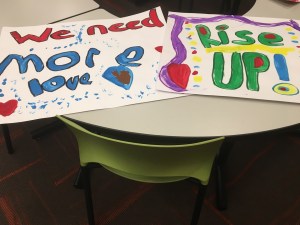
This post originally appeared in August, 2017 after the racial violence in Charlottesville. It has been substantially rewritten as of June 1, 2020.
What do we tell our children about race and racism? We begin by reminding them that we are made in the image of God who loves us—all of us; that we promise in our baptismal covenant “to seek and serve Christ in all persons,” to love our neighbors as ourselves, and “to strive for justice and peace among all people and respect the dignity of every human being.” There is no room for misunderstanding in these words. Love and peace are words our children hear us use often, but what about justice? “Justice is what love looks like in public,” says Cornel West. It is the work of the church, and of families, too.
How do we start? Jareesa Tucker McClure has great advice and several excellent resources to share from the days following the march in Charlottesville in this blog post. She doesn’t sugarcoat the challenge: “We owe it to our children to tell them the truth, no matter how uncomfortable it makes us feel. There are people in the world who hate others because of their skin color, religion or nation of origin. It’s our duty as parents to prepare our children for the real world. Sharing the truth helps build trust with your child, as they’ll know they can come to you to answer the hard questions with honesty.”
This is long, deep work, and for white parents especially, it is likely to push us out of our comfort zones. Parent Toolkit has some excellent advice on having conversations about race and racism. For white parents who want some training or conversation, take a look at the options offered at Raising Race Conscious Children. Older children, youth and adults will benefit from the “Talking About Race” resources offered through the National Museum of African American History and Culture. Books can give us a window into history and experiences vastly different from our own. Here’s a newly updated book list from Embrace Race and an older but still strong list from Parents Choice Foundation which includes books for middle and high school students with brief descriptions and age guidelines.
If in 2017 it seemed to be enough for white parents to talk with our children about racism, it’s now imperative that we also talk about the violent legacy of white supremacy and the endemic nature of racism, both structural and personal, that has brought us to this moment in the United States. This article from USA Today specifically addresses how to approach the topics of police brutality and the riots of the past week with both white children and children of color.
White friends, eradicating racism and white supremacy is our work to do. Centering Black experience is an essential part of understanding what is happening now, how the past has shaped our attitudes and our institutions, and what needs to change. This reading list is a great place to start. Don’t have time for a book right now? Try NPR’s Code Switch podcast or the Race/Related weekly newsletter from the New York Times. Seek out the good work already being done locally in organizations led by people of color. Support businesses owned and run by people of color. Read, or better yet, subscribe to The Root.
Minister, activist and Christian ethics professor Jennifer Harvey’s work focuses on white anti-racism in her newest book, published in January 2018, is Raising White Kids: Bringing Up Children in a Racially Unjust America. It’s full of examples and practical advice for parents and educators, and is a significant and much-needed addition to the conversation . Here’s an interview with her on NPR about how to talk about racially charged events with white kids.
As Christians, we must talk with our children about race and racial justice in the context of our faith. Pastor and parent Erin Wathen, in her book More Than Words: 10 Values for Modern Families, writes about environmental racism evidenced in the lead-poisoned tap water of Flint, Michigan. Yes, there is the immediate need to provide the community with safe water, but Wathen reminds us that the “transformative work of relationship takes place in community.” Speaking as a white woman and a member of a predominantly white denomination, it’s clear to me that in our families and in our churches we have the opportunity and the imperative to reach out to those whose experiences are different from our own, to really listen to and know one another and to strengthen existing relationships in ways that deepen our understanding, compassion and respect. “The act of service does not transform the deeper reality; the work of justice does.” When the deeper reality is transformed, the kingdom of God is revealed.
My book Faith at Home: A Handbook for Cautiously Christian Parents includes a chapter “Meeting God in Others” that you may find helpful as part of this conversation. I keep a Pinterest board for resources about talking with kids about racism here. You may also want to read this earlier blog post about the life and witness of Dr. Martin Luther King, Jr.
Leave a comment